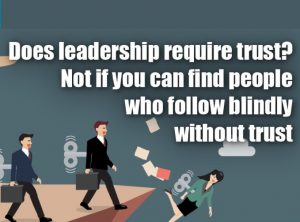Charles H. Green, founder and CEO of Trusted Advisor Associates, makes his living offering wisdom on how to build stronger relationships with clients and colleagues.
At the core of his work is the study of trust and its importance in business success. The strongest form of trust is always personal, he says. That’s why relationships are key.

Green, who has an MBA from Harvard and an undergraduate degree in Philosophy from Columbia, has been a consultant since 1976, founded Trusted Advisor Associates in 1997 and has worked with more than 100 clients throughout his career. He is also the author of three books and a sought-after speaker and seminar presenter.
We asked Green to share some insights pertaining to building trust in small business.
What are a few ways a small business can build trust with their customers?
There’s no great “trick” to it: it’s mostly executing on the basics. Listen to your customers – not with the aim of guessing what they want, but in order to show them respect. Be honest, open, and transparent. Take a few extra moments to care about them. Focus on relationships more than on transactions. When you don’t know something – say so. Don’t lie.
In some ways, we learned all this in kindergarten – and then forgot it in the blizzard of ‘expert’ advice about online marketing, CRM systems, and sales techniques. One simple truth is still simple, and true: the best way to get what you want is to focus on helping others get what they want.
To break it down more specifically regarding trust, consider the Trust Equation:
(Credibility + Reliability + Intimacy) / Self-Orientation
Basically:
Credibility: Expertise and truth-telling
Reliability: Dependability and keeping your word
Intimacy: Be a safe haven for what others share with you
Self-Orientation: Low self-orientation (good) means focusing on others, not on yourself
What are some ways a small business owner can be a better leader through trust?
The same trust factors (see above) that apply to customer relationships also apply to leadership. We follow people we trust: and we trust people whom we believe, find reliable, are easy to share issues with, and who have our best interests at heart.
In practical terms, two things are important for successful trust-based leadership. The first one is listening, as I mentioned earlier, and I mean not just listening to get information or solve problems — I mean listening as a form of respect. If you give respect, you get respect; and listening is a powerful way to do both. Give your team the rare and special gift of your attention.
The second thing is role-modeling. Walking the talk is always important, but when it comes to trust, it’s an absolute deal-breaker. Nobody will take you seriously about trust if you don’t behave in trusting and trustworthy ways yourself – it comes off as hypocritical.
And by the way – the best way to make your team members trustworthy is to find ways to trust them first.
Why is building trust so important to maximizing team performance for a small business?
Think about the advantages of a trust-based team: a team that trusts each other, and is trustworthy toward each other. Here are just a few benefits:
- They’ll accept advice from each other
- They’ll help each other out
- They’ll take each other at their word
- They’ll cut each other some slack
- They focus on the team and the firm, not just on the transactions between each other
- They’ll be more likely to share ideas – and to be more open to others’ ideas
- They’ll be more likely to offer candid advice, even criticisms, to each other
- They’ll be more likely to listen to candid advice, even criticisms, from each other
And you could probably add a lot more. A team that trusts each other is enormously powerful.
How can entrepreneurs, particularly in the B2B space, use trust principles to close more deals?
Particularly in the B2B space, Trust-based Selling is hugely powerful. It’s important enough that I wrote a whole book about it – Trust-based Selling. If this question is important to you, get online and get a copy.
If you can’t afford to get a copy, scan the 100 free articles and 1,000 free blogposts on my website (find them under Resources on TrustedAdvisor.com) about 30-40% of them have to do with trust and B2B sales. And just to give you a few teasers, here are some samples:
- Mention price sooner, not later, in your sales conversations
- Don’t worry about ‘giving away’ ideas; there is no shortage of customer problems
- Emulate “sample selling:” don’t talk about your credentials, show them by applying them to real customer problems
- Don’t give 50-page sales presentations: present the first three pages, and leave the rest for the audience to look through later at their leisure
- In meetings and calls, talk for only 60-120 seconds, then say, “but enough about me, let’s talk about you…” and ask a great question.
- Do fewer broadcast emails/social media; do more highly targeted, customer-specific reach-outs.
Which of your books would likely be most helpful to a small business?
With the exception of those particularly interested in B2B sales (noted earlier), I think the original The Trusted Advisor is the best general interest book for the typical small business. It covers all the basic ideas, and lets you extrapolate the ideas to your specific situations.
Please send GrowBiz topic suggestions and feedback to sbdc@fiu.edu


